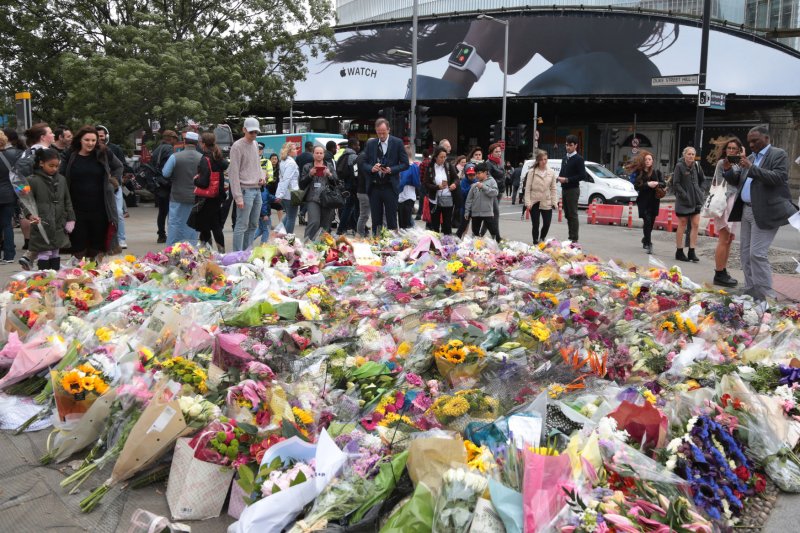Members of the public look at tributes posted to the victims of last Saturday's terror attack in London Bridge on June 8. Photo by Hugo Philpott/UPI |
License Photo
LONDON, June 26 (UPI) -- A series of lone-wolf attacks, both by radical Islamists and anti-Muslim individuals in the West, raised concerns that the global war on terror is entering a dangerous new phase.
After incidents in London, Paris, Brussels and Michigan, the risk of similar low-tech, copycat attacks is triggering alarm. This has been accompanied by an increase in right-wing anti-Muslim sentiment.
The number of people arrested on suspicion of Islamist terrorism in Europe rose in 2016 for the third year in a row, a report by the European Union's police agency Europol confirmed. The report noted a rise in violence attributed to right-wing groups.
The report said that Europe's far-right was exploiting terrorist attacks "to induce public opinion to adopt its xenophobic and Islamophobic position." In 2017, that exploitation had led to right-wing terrorist attacks targeting Muslims, as seen in the Finsbury Park mosque attack in London.
"I want to kill all Muslims," Darren Osborne, 47, allegedly shouted after driving a van into a group of Muslims. The attack bore similarities to Islamic State-inspired attacks, such as those carried out last year in Nice and Berlin.
Far-right extremists and white supremacists, not just in Britain but across Europe and the United States, took to social media to call for similar attacks. IS also sought to exploit Islamophobic attacks, calling on supporters to "wake up" and fight back.
The addition of anti-Muslim attacks to the cycle of terror is worrying to observers who fear copycat attacks. If sustained, the cycle of anti-Western violence and its mirror anti-Muslim crimes could lead to a new wave of radicalization and extremism.
Writing for the BBC, security correspondent Frank Gardner, a survivor of a terrorist attack, warned that extremism breeds extremism.
"The one thing that far-right anti- Muslim extremists and violent jihadists have in common is the belief that peaceful coexistence between Muslims and non-Muslims is impossible," he said.
The only way to overcome such extremism and terrorism is unity in the face of all terrorist attacks. "The unified prayers and solidarity across communities that followed recent terror attacks are anathema to them," Gardner said.
Speaking to Muslims and non- Muslims at a vigil outside the Finsbury Park mosque after the attack, mosque chairman Mohammed Kozbar echoed those sentiments.
"These extremists, their aim is to divide our communities... to spread hatred, fear and division," he said. "These people can try to divide us but we tell them that we will not let you do that."
This article originally appeared at The Arab Weekly.















